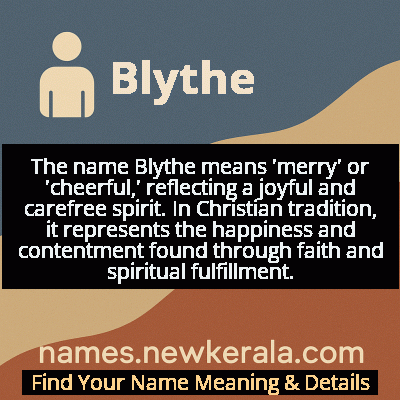Blythe Name Meaning & Details
Origin, Popularity, Numerology Analysis & Name Meaning of Blythe
Discover the origin, meaning, and cultural significance of the name BLYTHE. Delve into its historical roots and explore the lasting impact it has had on communities and traditions.
Name
Blythe
Gender
Male
Origin
Christian
Lucky Number
9
Meaning of the Name - Blythe
The name Blythe means 'merry' or 'cheerful,' reflecting a joyful and carefree spirit. In Christian tradition, it represents the happiness and contentment found through faith and spiritual fulfillment.
Blythe - Complete Numerology Analysis
Your Numerology Number
Based on Pythagorean Numerology System
Ruling Planet
Mars
Positive Nature
Generous, passionate, energetic, and humanitarian.
Negative Traits
Impulsive, impatient, moody, and can be overly emotional.
Lucky Colours
Red, maroon, scarlet.
Lucky Days
Tuesday.
Lucky Stones
Red coral, garnet.
Harmony Numbers
1, 2, 3, 6.
Best Suited Professions
Military, sports, philanthropy, leadership roles.
What People Like About You
Courage, energy, leadership, generosity.
Famous People Named Blythe
Blythe Danner
Actress
Academy Award-winning actress known for roles in 'Meet the Parents' and 'The Last Kiss'
Blythe Masters
Investment Banker
Former JPMorgan Chase executive credited with helping develop credit default swaps
Blythe Auffarth
Actress
Known for her role in the film 'The Last House on the Left' and various television appearances
Blythe Spirit
Literary Character
Title character from Noël Coward's famous play about a ghostly first wife
Name Variations & International Equivalents
Click on blue names to explore their detailed meanings. Gray names with will be available soon.
Cultural & Historical Significance
In Christian naming traditions, Blythe represents the ideal of finding happiness through faith and living according to Christian principles of love and contentment. The name carries with it the expectation of embodying Christian joy - not merely superficial happiness, but the deep, abiding contentment that comes from spiritual fulfillment. This makes it particularly significant in Christian communities where names are chosen not just for their sound, but for the virtues they represent and the spiritual aspirations they embody for the child's future character development.
Extended Personality Analysis
Individuals named Blythe are typically characterized by their cheerful disposition and optimistic outlook on life. They possess a natural ability to find joy in everyday situations and often serve as sources of positivity for those around them. Their carefree nature doesn't imply irresponsibility but rather a healthy perspective that allows them to navigate challenges with grace and humor. Blythes tend to be socially adept, making friends easily with their warm and approachable demeanor. They often exhibit creative tendencies and appreciate beauty in various forms, from art to nature.
While generally easygoing, Blythes can be surprisingly resilient when faced with adversity, drawing strength from their inherent optimism. Their personality reflects the name's meaning perfectly - they bring light and happiness to any environment they inhabit. They tend to be good listeners and empathetic friends, often helping others see the brighter side of difficult situations. Their cheerful nature is typically genuine rather than forced, stemming from a deep-seated appreciation for life's blessings. This makes them particularly well-suited for careers involving caregiving, teaching, or creative pursuits where their positive energy can inspire and uplift others.
Modern Usage & Popularity
In contemporary naming practices, Blythe maintains its status as an uncommon but meaningful choice, particularly appreciated for its positive connotations and literary connections. While the name has seen increased usage for females in recent decades, it continues to be used for males, preserving its traditional gender flexibility. Current popularity trends show it ranking outside the top 1000 names in most English-speaking countries, making it a distinctive option that avoids being overly common or trendy. Modern parents are drawn to Blythe for its combination of classic heritage and contemporary appeal, as well as its association with happiness and emotional freedom in an increasingly complex world. The name's usage often reflects parents' desires to instill positive qualities in their children from birth through nominative determinism.
Symbolic & Spiritual Meanings
Symbolically, Blythe represents the human capacity for joy and the ability to maintain lightness of spirit even in challenging circumstances. It embodies the concept of grace under pressure and the wisdom of choosing happiness as a conscious life approach. The name carries connotations of emotional freedom, suggesting someone unburdened by unnecessary worries or negative thinking. In metaphorical terms, Blythe symbolizes sunlight breaking through clouds, spring after winter, and the resilience of the human spirit. It represents the ideal of living authentically and embracing life's pleasures without guilt or reservation, while also signifying the Christian virtue of finding contentment through faith rather than external circumstances.

